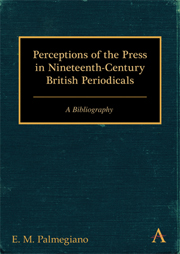Book contents
- Frontmatter
- Contents
- Preface
- Introduction
- Annotated Bibliography
- Ainsworth's Magazine, 1842–1854
- All the Year Round, 1859–1895
- Bentley's Miscellany, 1837–1868
- Bentley's Quarterly Review, 1859–1860
- Blackwood's Edinburgh Magazine, 1824–1900
- The British and Foreign Review, 1835–1844
- The British Quarterly Review, 1845–1886
- Chambers's (Edinburgh) Journal, 1832–1900
- The Contemporary Review, 1866–1900
- The Cornhill Magazine, 1860–1900
- The Dark Blue, 1871–1873
- The Dublin Review, 1836–1900
- The Dublin University Magazine, 1833–1880
- The Edinburgh Review, 1802–1900
- The Foreign Quarterly Review, 1827–1846
- The Fortnightly Review, 1865–1900
- Fraser's Magazine for Town and Country, 1830–1882
- Good Words, 1860–1900
- Hogg's (Weekly) Instructor, 1845–1856
- The Home and Foreign Review, 1862–1864
- Household Words, 1850–1859
- Howitt's Journal, 1847–1848
- The Leisure Hour, 1852–1900
- The London Quarterly Review, 1853–1900
- The London Review, 1829–1830
- Longman's Magazine, 1882–1900
- Macmillan's Magazine, 1859–1900
- The Modern Review, 1880–1884
- The Monthly Chronicle, 1838–1841
- Murray's Magazine, 1887–1891
- The National Review, 1855–1864
- The National Review, 1883–1900
- The New Monthly Magazine, 1821–1854
- The New Quarterly Magazine, 1873–1880
- The New Review, 1889–1897
- The Nineteenth Century, 1877–1900
- The North British Review, 1844–1871
- The Oxford and Cambridge Magazine, 1856
- The Prospective Review, 1845–1855
- The Quarterly Review, 1824–1900
- The Rambler, 1848–1862
- Saint Pauls, 1867–1874
- The Scottish Review, 1882–1900
- Tait's Edinburgh Magazine, 1832–1855
- Temple Bar, 1860–1900
- The Theological Review, 1864–1879
- Titan: A Monthly Magazine, 1856–1859
- The Westminster Review, 1824–1900
- Key to Indexes
- Author Index
- Subject Index
The New Review, 1889–1897
from Annotated Bibliography
Published online by Cambridge University Press: 05 May 2012
- Frontmatter
- Contents
- Preface
- Introduction
- Annotated Bibliography
- Ainsworth's Magazine, 1842–1854
- All the Year Round, 1859–1895
- Bentley's Miscellany, 1837–1868
- Bentley's Quarterly Review, 1859–1860
- Blackwood's Edinburgh Magazine, 1824–1900
- The British and Foreign Review, 1835–1844
- The British Quarterly Review, 1845–1886
- Chambers's (Edinburgh) Journal, 1832–1900
- The Contemporary Review, 1866–1900
- The Cornhill Magazine, 1860–1900
- The Dark Blue, 1871–1873
- The Dublin Review, 1836–1900
- The Dublin University Magazine, 1833–1880
- The Edinburgh Review, 1802–1900
- The Foreign Quarterly Review, 1827–1846
- The Fortnightly Review, 1865–1900
- Fraser's Magazine for Town and Country, 1830–1882
- Good Words, 1860–1900
- Hogg's (Weekly) Instructor, 1845–1856
- The Home and Foreign Review, 1862–1864
- Household Words, 1850–1859
- Howitt's Journal, 1847–1848
- The Leisure Hour, 1852–1900
- The London Quarterly Review, 1853–1900
- The London Review, 1829–1830
- Longman's Magazine, 1882–1900
- Macmillan's Magazine, 1859–1900
- The Modern Review, 1880–1884
- The Monthly Chronicle, 1838–1841
- Murray's Magazine, 1887–1891
- The National Review, 1855–1864
- The National Review, 1883–1900
- The New Monthly Magazine, 1821–1854
- The New Quarterly Magazine, 1873–1880
- The New Review, 1889–1897
- The Nineteenth Century, 1877–1900
- The North British Review, 1844–1871
- The Oxford and Cambridge Magazine, 1856
- The Prospective Review, 1845–1855
- The Quarterly Review, 1824–1900
- The Rambler, 1848–1862
- Saint Pauls, 1867–1874
- The Scottish Review, 1882–1900
- Tait's Edinburgh Magazine, 1832–1855
- Temple Bar, 1860–1900
- The Theological Review, 1864–1879
- Titan: A Monthly Magazine, 1856–1859
- The Westminster Review, 1824–1900
- Key to Indexes
- Author Index
- Subject Index
Summary
Reinventing itself regularly, the New Review expounded on anonymity and “new journalism.”
1. Coleridge, [John Duke, 1st Baron]. “Matthew Arnold.” 1 (1889): 111–24, 217–32.
Rated some of Arnold's columns on the American press “absurd and contemptible” but not unusual in journalism. The French regularly blasted the brutality of British newspapers.
2. Bigelow, Poultney. “The German Emperor.” 1 (1889): 243–57.
Personified Wilhelm II as a man with “little patience” for his supposed enemies in journalism. For example, the “Deutsche Rundschau, the leading literary review, was seized by police because it published a section of the late Emperor's diary.”
3. O'Connor, T. P. “The New Journalism.” 1 (1889): 423–34.
Configured New Journalism as “more personal in tone.” Reporting the “appearance, the habits, the clothes, or the home and social life” of an individual had previously been “an impertinence and almost…an indecency.” “Personal journalism” in 1889 was “healthy…rational” because it gave to history a picture of a whole person, but it should be selective, which was not a trait of the American press. Gossip should never extend to “slander, scandal… personal attack.” Still, it was better to be outspoken because “the public suffer a great deal more from the cowardice than from the audacity of journalism, from the suppression than from the publication of awkward facts.” Newspapers should not hesitate to expose fraud, as in advertisements, because editors were timid or needed money.
- Type
- Chapter
- Information
- Perceptions of the Press in Nineteenth-Century British PeriodicalsA Bibliography, pp. 457 - 465Publisher: Anthem PressPrint publication year: 2012



